What's Happening?
AXIS Architecture + Design has completed the renovation and brand conversion of the 1 Hotel Seattle, marking a significant addition to their portfolio in hospitality design. The project involved transforming the former Pan Pacific Hotel Seattle into a luxury urban retreat inspired by the Pacific Northwest's natural landscapes. The renovation included a nature-driven design with sustainable elements, such as reclaimed wood and biophilic features, to align with 1 Hotel's brand ethos. The hotel now boasts updated public spaces, guestrooms, and suites, all reflecting the region's iconic coastal rainforest and mountain backdrop.
Why It's Important?
The completion of the 1 Hotel Seattle renovation by AXIS Architecture + Design underscores the growing trend of integrating sustainability and local cultural elements into hospitality design. This project not only enhances the luxury hotel offerings in Seattle but also sets a precedent for future developments in the region. By targeting LEED Silver certification and diverting construction waste from landfills, the renovation highlights the importance of environmentally conscious design in the hospitality industry. This approach benefits both the local economy and the environment, attracting eco-minded travelers and boosting tourism.
What's Next?
Following the successful renovation, 1 Hotel Seattle is expected to attract a diverse clientele seeking luxury accommodations with a focus on sustainability. AXIS Architecture + Design may leverage this project to expand their presence in the Pacific Northwest and pursue similar projects that emphasize eco-friendly design. The hotel's commitment to sustainability could inspire other hospitality businesses to adopt similar practices, potentially influencing industry standards and consumer expectations.
Beyond the Headlines
The renovation of 1 Hotel Seattle reflects broader cultural shifts towards valuing local heritage and environmental stewardship in commercial architecture. By incorporating elements inspired by the Duwamish Tribe and Coast Salish Tribes, the design fosters a deeper connection to the region's history and indigenous cultures. This approach not only enriches the guest experience but also promotes cultural awareness and respect, which could lead to more inclusive and culturally sensitive design practices in the future.











